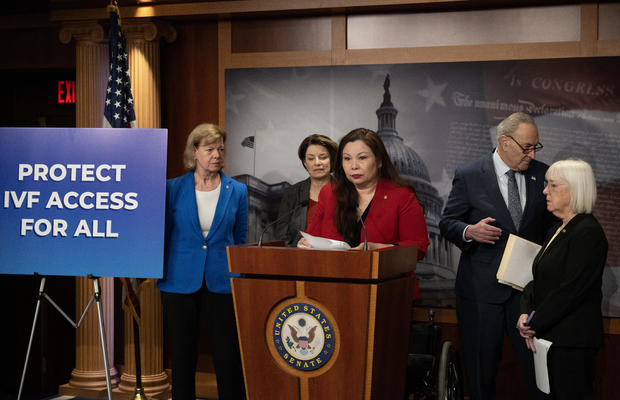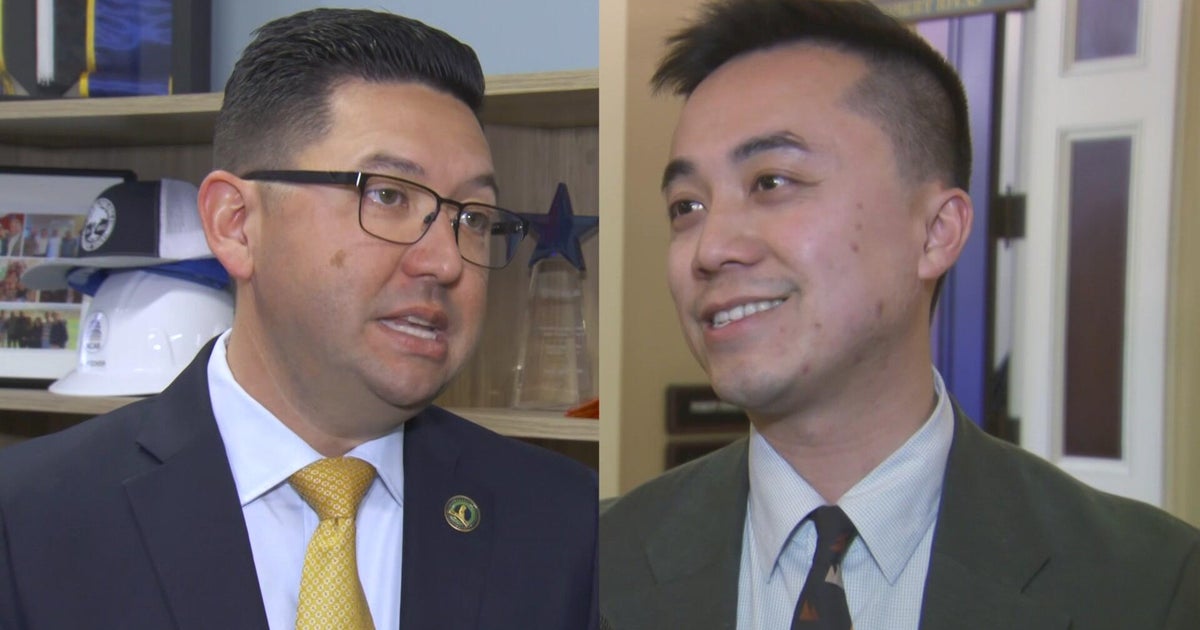Senate Republican blocks bill that would protect access to IVF nationwide
Washington — One Senate Republican on Wednesday scuttled a Democrat-led effort to pass legislation that would safeguard access to IVF nationwide.
The bill aims to preempt state efforts to restrict access to the fertility treatments since a ruling earlier the Alabama Supreme Court ruled earlier this month that frozen embryos could be considered children under a state law. The decision made it possible for couples whose frozen embryos were accidentally destroyed to sue for wrongful death of their "extrauterine children." The ruling has paused IVF treatments and processes in the state as providers evaluate their liability.
Sen. Tammy Duckworth, an Illinois Democrat, sought to approve the legislation under unanimous consent, which gives any single lawmaker the power to block its passage. The bill would create federal protections for IVF access nationwide, after access to the fertility treatment often used by women who struggle to become pregnant has come into question under state law in Alabama. Sen. Cindy Hyde-Smith, a Mississippi Republican blocked the bill on Wednesday.
"The bill before us today is a vast overreach that is full of poison pills that go way too far," Hyde-Smith said on the Senate floor after she objected to the bill's passage.
Duckworth first introduced the legislation, known as the Access to Family Building Act, with Sen. Patty Murray in 2022. The move on Wednesday marked the second time Duckworth has brought the bill to the Senate floor for a vote after she attempted to pass it by unanimous consent in 2022. At the time, Hyde-Smith also opposed.
Although many Senate Republicans oppose the Alabama ruling and have thrown their support behind IVF, some have argued that the issue should be decided by states. But it is threatening to become a liability for Republicans. Polls show that large majorities of Americans from both parties favor access to IVF.
Meanwhile, Democrats have tied the issue to abortion, viewing it as a new front in the battle over abortion access since the U.S. Supreme Court overturned Roe v. Wade in 2022.
"Donald Trump suddenly supports IVF after crowing and claiming and taking credit for the fall of Roe v. Wade. You can't do both," Duckworth said at a news conference on Tuesday.
Sen. Richard Blumenthal, a Connecticut Democrat, told reporters ahead of the vote that he expected Democrats to "keep at it" if Republicans blocked the bill.
"We trust women to make decisions about their own reproductive health care," he said. "And the IVF dilemma for Republicans is they are down a path that is not only unpopular, it's untenable as a matter of constitutional law and basic moral imperative, and we're gonna pursue it vigorously."
At least 16 states have proposed personhood bills that could impact access to IVF treatments, according to the Guttmacher Institute, a research group that studies reproductive health rights.
Legal experts caution that even state laws might not be enough.
"There's a possibility that whatever the legislature does will be challenged as violating the rights of fetal persons," said Mary Ziegler, a professor at the University of California Davis School of Law.
IVF advocates on Wednesday also rallied on the steps of the Alabama State House, urging lawmakers to protect IVF providers from civil and criminal prosecution.
Among them was Sarah Houston, who had her uterus removed after a diagnosis of cervical cancer. Wanting another child, she endured the painful and expensive IVF process. An embryo was going to be transferred to a surrogate in March. Following the Alabama Supreme Court's ruling, however, it is now on hold.
"It's heartbreaking to feel like it was that close," Houston said. "And then now to kind of feel like maybe we're even back at the beginning."
Houston is holding onto hope for another child. Amid her cancer struggle, her children Vi and Henry give her infinite joy.
"They're awesome, and being a mom is awesome," Houston said, adding that not getting that opportunity again "would be devastating."
"Obviously an embryo transfer doesn't mean that it's a guarantee that you'll end up with a baby," Houston said. "But without that, there's no hope of us having a baby."
— Janet Shamlian and Alan He contributed reporting.








